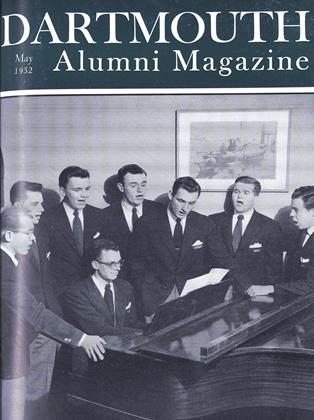ALTHOUGH losing consecutively to Rollins, Florida Southern and Tampa, the Dartmouth varsity heavyweight crews performed exceptionally well and evidenced a high potential during their 11- day spring trip to Florida. Readying two boats for their first three races with only six days' practice, the Big Green oarsmen fought each opponent closely to the finish line—opponents with two to three months' practice under their belts plus previous racing experience.
Dartmouth was at its spring-trip peak on April 7 in the first race against a strong Rollins crew. The Green jumped its opponent by half a length at the start and held a slight lead up to the halfway mark, where Rollins came up slowly and with an early splint gained a full boat length lead on the Indians at the three-quarter mark. Dartmouth moved up when Stroke Dave Chamberlain upped the stroke for a final sprint, but Rollins held off the Green bid and went away during the last; twenty yards to win by a full length. The Rollins crew was forced to a time of 4:47, four seconds short of the record for the nine-tenths of a mile, while Dartmouth was clocked at 4:52. The Green JV's lost an almost identical race by 1½ lengths.
On the following day a highly conditioned Florida Southern College varsity eight took the Big Green in the body of the race to win by 1½ lengths. Dartmouth again jumped away to a lead, and although rowing a wobbly middle third of the race remained close to the leaders all the way, and pushed Southern to tie the existing course record set by Washington and Lee in 1948. Times: FSC 4:32, Dartmouth 4:37. The JV's jumped the Southern second boat on the start, but after a rudder break that steered the home shell almost into Dartmouth the Green junior eight lost its form and never could regain it, losing by a decisive 2½ lengths.
The Big Green showed little of its previous power and fine form in the race at Tampa on April 10, losing by an even boat length. The lack of adequate conditioning again evidenced itself during the body of the race, and the final sprint was not enough to regain the lead lost to Tampa. The times were slow, Tampa finishing the Hillsborough River mile course in 5:42, Dartmouth in 5:47.
Considering the meager amount of practice the Indians had before meeting their well-conditioned southern rivals, the Green crews put up amazing performances. Sickness struck three oarsmen at intervals throughout the trip, and this cap plus long practices in unfamiliar heat and too much travelling sapped most of Dartmouth's sharpness and reserve toward the end of the trip. The caliber of the crews faced was, except for Tampa, far above that of last year, yet Dartmouth's showing in the South was nevertheless much finer than in 1951.
The varsity 150 lb. crew travelled to Kent, Conn., for a week's practice. The frosh heavies went to Philadelphia and the frosh 150's to St. Andrew's School in Baltimore. None of these boats participated in formal races, but each got valuable hours of practice on the water.
 View Full Issue
View Full Issue
More From This Issue
-
 Class Notes
Class Notes1918
May 1952 By ERNEST H. EARLEY, DONALD L. BARR, RICHARD A. HOLTON -
 Class Notes
Class Notes1929
May 1952 By F. WILLIAM ANDRES, EDWIN C. CHINLUND, GEORGE B. REDDING -
 Article
ArticleAshurnazirpal's Story
May 1952 By DONALD P. HANSEN '53 -
 Class Notes
Class Notes1917
May 1952 By KARL W. KOENIGER, DONALD BROOKS, HOWARD A. STOCKWELL -
 Article
Article25 Years After
May 1952 By JAMES D. BINDER '52 AND THOMAS L. PAPST '52 -
 Article
ArticleThe Undergraduate Year
May 1952 By KENNETH J. ROMAN JR. '52
Jonathan Moore '54
Sports
-
 Sports
SportsHOCKEY
FEBRUARY, 1928 -
 Sports
SportsOh, The Ignominy Of It All
FEBRUARY • 1988 -
 Sports
SportsGreen Jottings
July 1953 By Cliff Jordan '45 -
 Sports
SportsBig Green Teams
December 1942 By Elmer Stevens JR. '43 -
 Sports
SportsMISCELLANY
December 1945 By Francis E. Merrill '26 -
 Sports
SportsA Record That Wasn’t
NovembeR | decembeR By PETE WEBSTER ’71




